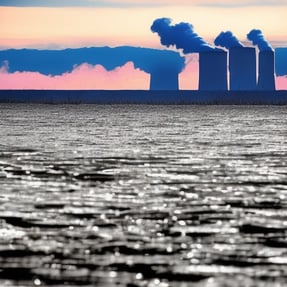Introduction
 Climate change is no longer a distant worry that only scientists must think about. It is here, and it’s real. We are living through one of the most rapid changes in global climate ever seen on Earth, with huge consequences for us all—no matter where we live or what our jobs are. To truly understand how climate change will affect us today and into the future, we need to look at both long-term trends and short-term impacts that are happening right now.
Climate change is no longer a distant worry that only scientists must think about. It is here, and it’s real. We are living through one of the most rapid changes in global climate ever seen on Earth, with huge consequences for us all—no matter where we live or what our jobs are. To truly understand how climate change will affect us today and into the future, we need to look at both long-term trends and short-term impacts that are happening right now.
It is one of the most pressing issues of our times, and it’s something that affects us all. We are all feeling the impacts from increased temperatures to rising sea levels, and no one can ignore the fact that the climate is changing rapidly. As modern society has become increasingly industrialized, we have released more and more emissions into the atmosphere leading to an increase in greenhouse gases which trap heat in our atmosphere, causing global temperatures to rise. Simply put, climate change is becoming a bigger problem every day, and it’s essential that we understand how it works as well as what we can do to prevent further damage from occurring. In this blog post, I will discuss what causes climate change, how it affects us on a personal level and some of the solutions we can implement to mitigate its effects.
Climate Change: Wide-ranging Implications
Climate change has far-reaching implications for humans, affecting virtually every aspect of our lives. Increased temperatures and changing weather patterns lead to more extreme and unpredictable events such as heat waves, droughts, floods and hurricanes, with devastating economic and human consequences. Warmer oceans bring a rise in sea level and acidification which puts coastal regions at risk. The increased prevalence of vector-borne diseases threatens the health of populations around the world. These effects can have a drastic impact on livelihoods, economies, and even political systems worldwide. In addition to these physical impacts, climate change presents an ethical challenge to all of humanity - we are obligated to protect our planet for current and future generations.
Ways to help address climate change
Humans can be effective in addressing climate change by reducing their environmental impact. This includes reducing emissions from fossil fuels, utilizing renewable energy sources like solar and wind, conserving and protecting natural resources, and increasing energy efficiency. Additionally, individuals can take personal action by making sustainable lifestyle choices such as recycling, driving less and eating less meat. Supporting green businesses that are committed to sustainability and investing in clean energy technology is also essential. Finally, getting involved with organizations that are advocating for climate action is an important way to help raise awareness and influence policy changes that will benefit the environment. There are many organizations that are dedicated to fighting climate change and protecting our planet. These include international non-governmental organizations (NGOs) such as Greenpeace, 350.org, and Friends of the Earth, as well as national and regional organizations like the Sierra Club, Climate Reality Project, and Sunrise Movement. There are also businesses that have committed to reducing their carbon footprint or producing sustainable products. Finally, governmental initiatives such as the Paris Agreement are crucial in promoting action on a global scale to combat the effects of climate change.
Emissions act like a blanket trapping heat
Most people know by now that emissions produced by human activities such as burning fossil fuels are primarily responsible for climate change. When these emissions enter the atmosphere they act like a blanket trapping heat, causing global temperatures to rise steadily over time -it’s estimated that since preindustrial times global temperatures have risen by 1°C -and if unchecked could keep on increasing at an even faster rate. As far as individuals go there are several measures you can take right now to reduce your carbon emissions; for example, you could start reducing your meat consumption or switch to sustainable forms of energy such as solar or wind power whenever possible.
Invest in energy-efficient appliances
Additionally, you may want to invest in energy-efficient appliances/lightbulbs for your home or travel less frequently with airplanes or cars -all of which would help greatly when it comes to reducing your own personal carbon footprint! Furthermore, organizations like Climate Change Education Foundation are crucial when it comes to raising awareness about this urgent issue not just amongst adults but also children around the world who will later shape society’s future decisions regarding sustainability. With various initiatives such as school programs about climate science offered by CCE Foundation as well as public events held across multiple cities every year -we can work together to make sure everyone understands why it’s so important that we protect our planet before irreparable damage has been done!
Conservation efforts must be made now in order to save our oceans
Climate change is also having devastating effects on the world's oceans and sea life. Rising sea temperatures, acidification levels, ocean deoxygenation, and marine pollution are all contributing to a rapid decrease in biodiversity. Global warming has caused coral reefs to bleach and die off around the world, destroying habitats that many species rely on for survival, while overfishing and heavy extraction of resources continue to threaten dwindling populations of fish and mammals. Conservation efforts must be made now if we are to save our oceans and their inhabitants from further destruction. While the effects of climate change on our oceans and marine life are already being felt, there are still steps that can be taken to protect these vulnerable species. Setting up protected areas in the ocean, reducing overfishing and destructive fishing practices, limiting nutrient runoff from land-based activities, ceasing offshore drilling and other ocean-based extractive industries, and establishing more efficient waste management systems are all ways we can help conserve the marine environment. Additionally, developing renewable energy sources such as solar, wind and wave power can reduce our reliance on fossil fuels which contribute significantly to greenhouse gas emissions. All of these efforts can help to slow down or even reverse some of the damaging effects of climate change on our oceans.
Conclusion
In conclusion, climate change is not something that should be taken lightly: with rising seas levels and extreme weather events becoming increasingly common throughout the world -it’s clear that something needs done quickly if we don’t want things getting worse before they get better again! Although there may be no easy solution-increasingly more organizations worldwide (such as CCE Foundation) are striving towards finding long term solutions together with implementing sustainability practices into regular life so hopefully one day soon things will look drastically different for us all! Even though the Earth has gone through climate changes before, the rapidity and human contribution to this recent change is unprecedented. We need to discuss what we can do to lessen our impact and stop contributing to climate change. Climate change is real, it is happening right now, and we are the cause.
There is no single solution to the impacts of climate change on our oceans and sea life, but rather a multitude of actions that must be taken. Implementing effective conservation measures and sustainable practices, reducing emissions from fossil fuels, and shifting towards renewable energy sources can all help to mitigate the effects of climate change and protect marine ecosystems. We have the power to make a difference by making conscious decisions to reduce our carbon footprint and work together to create sustainable solutions for our oceans. How can we work together to make Earth a livable place for generations to come?


 Safrin Bakth
Safrin Bakth